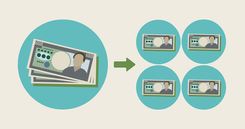Establish a budget: The first step to start saving is to establish a detailed budget. This means writing down all income and expenses to see how much money is really needed to cover basic expenses such as food, transportation and housing. Setting a detailed budget will make it easier to see how much money is left to save.
Increase income: When it comes to saving money, the ideal scenario is to have more income than expenses. This means finding ways to increase income, either by working a second job or earning money on the side. This will leave you with more resources to put toward savings.
Take advantage of promotions: Also look for ways to reduce expenses, such as taking advantage of deals and promotions at stores or using discount coupons. Comparing prices before buying and choosing those that have deals or discounts is a good way to save money in the long run.
Check income and expenses
It is very important to check your income and expenses to know how much money you have to save. This way you can identify what your spending habits are and what things you are spending unnecessarily. This will help you evaluate your savings options and start planning the right budget.
Establish a budget
A budget is a key tool to start saving. Establishing a budget will help you increase your savings and decrease debt. First, add up your income and make sure expenses do not exceed total income. Next, identify fixed expenses such as rent, utilities, and set an amount for your variable expenses. Finally, review your budget each month to see how much you can save.
Adjusting expenses
To save money, it's important to start by adjusting expenses. This means reevaluating all expenses, from groceries to luxury items, to see which expenses can be eliminated or reduced. Identifying these areas where savings can be made will help jumpstart the savings process. If necessary, and possible, consider switching to cheaper service providers to get a better price.
Saving money also involves evaluating how you use your money. For example, buy healthy foods instead of expensive junk foods that don't last as long. This will help reduce unnecessary spending and help you stay healthy at the same time. It is also important to be aware of your shopping habits and avoid the temptation to buy unnecessary things that will only decrease your ability to save.
Saving with technology
Technology has brought with it easy solutions for savers. Mobile banking apps allow you to monitor your daily spending, receive credit card notifications and keep track of your money usage in real time. Many apps allow for automatic savings scheduling, which helps you maintain a stable budget.
Diversify savings
It's important to diversify your savings to get the best results. You can opt for investments in real estate, stocks or mutual funds to diversify your savings and optimize your long-term returns. Remember that the main objective of investing is to obtain higher returns in the long term.












